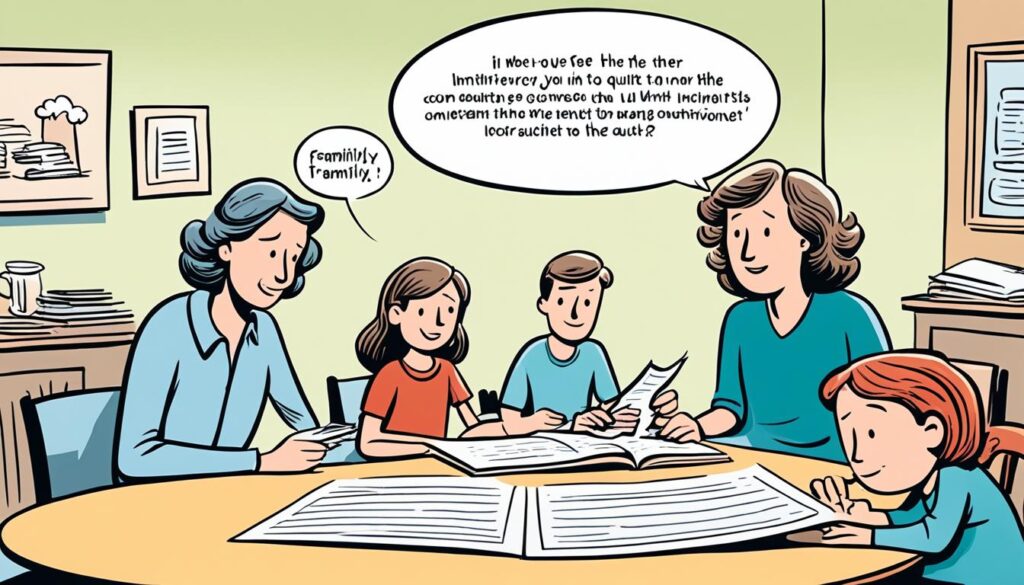Do you find it challenging to navigate family dynamics with introverted family members? Are you unsure about how to communicate with introverts or support their needs within a family setting? Understanding introverts and their unique personality traits is key to fostering healthy relationships and creating a harmonious environment.
Introverts, unlike extroverts, gain energy from solitary activities and need time alone to recharge. They may prefer one-on-one interactions over group settings and find crowded family gatherings overwhelming. But how can you bridge the gap and create meaningful connections with your introverted loved ones?
In this article, we will explore nine effective strategies for dealing with introverted family members. From understanding the need for alone time to finding shared quiet hobbies, you’ll discover practical tips to foster understanding and support within your family.
Key Takeaways:
- Understand the importance of recharging for introverts and create an environment that allows them to have alone time.
- Respect their need for solitude and provide personal space within the family environment.
- Find alternative options for introverts to participate in crowded family gatherings without feeling overwhelmed.
- Engage in one-on-one conversations to make introverted family members feel more comfortable.
- Don’t take the need for solitude personally and support introverts during their periods of introspection.
Understand Recharging is Necessary
Introverts have unique needs when it comes to their energy levels. While extroverts gain energy from social interactions, introverts require alone time to recharge and regain their inner strength. Understanding and respecting the importance of recharging for introverts is crucial for maintaining healthy and harmonious relationships within your family.
Recharge time allows introverts to escape the external stimuli that can sometimes overwhelm them. It provides them with an opportunity to process their thoughts, reflect on their experiences, and rejuvenate their energy levels. Alone time and personal space are essential for introverts to recharge and regain their mental and emotional balance.
To create an environment that supports introverts’ recharge needs, consider the following tips:
- Designate a specific space in your home where introverts can retreat to when they need solitude.
- Establish boundaries and communicate the importance of alone time to other family members.
- Encourage introverts to engage in activities that bring them joy and help them recharge, such as reading, meditating, or pursuing hobbies.
- Respect their need for quiet and minimize distractions during their recharge time.
By understanding and valuing the need for recharging, you can create a supportive and nurturing environment for the introverted members of your family.
| Recharge Time Tips |
|---|
| Designate a specific space for introverts to retreat to |
| Set boundaries and communicate the importance of alone time |
| Encourage introverts to engage in activities that bring them joy |
| Respect their need for quiet and minimize distractions |
Respect Their Need for Alone Time
Introverts thrive in solitude and require personal space to recharge and rejuvenate their energy. Respecting their need for alone time is crucial for maintaining harmony within the family. By creating an environment that honors their space, you can ensure that introverted family members feel understood and supported.
One way to provide enough space for introverts is by designating a specific area in the house where they can retreat and enjoy their solitude. This could be a cozy corner with a comfortable chair and a bookshelf, or a peaceful study room where they can pursue their hobbies or engage in introspection. By setting aside a dedicated space for solitude, you are showing consideration for their need to recharge without interruptions.
Additionally, it’s important to recognize that introverts have their own comfort zone, and pushing them beyond it can be overwhelming. However, supporting them in stepping out of their comfort zone can lead to personal growth and new experiences. Encourage them gently to try new activities or engage in social events, but always respect their boundaries and give them the freedom to choose when they’re ready to explore beyond their comfort zone.

| Ways to Respect Their Need for Alone Time | Examples |
|---|---|
| Create a designated space for solitude | Transform a spare room into a mini-library or personal retreat |
| Communicate the importance of personal space | Let other family members know when you need alone time and ask for their understanding |
| Set boundaries and respect their need for solitude | Avoid interrupting or invading their personal space when they’re in their designated alone time area |
| Suggest activities that can be enjoyed alone | Recommend reading, painting, or practicing meditation as solitary pastimes |
| Be mindful of their comfort zone | Encourage participation in non-threatening social activities, such as joining a small interest group or attending intimate gatherings |
Respecting introverts’ need for solitude and providing them with enough personal space not only demonstrates your understanding and support but also strengthens the bond within the family. By creating an environment that values both togetherness and individuality, you can truly foster a harmonious family dynamic.
Avoid Crowded Family Gatherings
Crowded family gatherings, especially during the holiday season when extended family members come together, can pose unique challenges for introverts. The presence of lots of people and the constant social interaction can be overwhelming and draining for introverted individuals who thrive in quieter and more intimate settings.
However, there are alternative options that can help introverts find a balance between participating in family gatherings and maintaining their well-being. For example:
- Consider organizing smaller and more intimate gatherings with immediate family members or close friends to create a more comfortable environment.
- Encourage individual family members to spend quality one-on-one time with introverts, engaging in activities that align with their interests and provide a quieter setting.
- Respect introverts’ need for downtime and personal space during crowded family gatherings. Designate specific areas or rooms where introverts can retreat to for a short period of time to recharge.
- Plan a mix of group activities and individual downtime during family gatherings. This can create a balance and ensure that everyone’s needs are met.
Creating an inclusive and understanding environment during crowded family gatherings is essential to support introverted family members and ensure their well-being. By being mindful of their needs, it’s possible to create a more enjoyable and harmonious experience for everyone involved.
Engage One-on-One, Not in Groups
When interacting with introverted family members, it’s important to recognize and respect their preference for one-on-one interactions over group settings. Introverts tend to thrive in more intimate and meaningful conversations, where they can fully express themselves without the pressure of a larger audience.
In order to engage with introverted family members on a deeper level, here are some tips to initiate and navigate one-on-one conversations:
- Choose the right setting: Find a quiet and comfortable environment where both of you can have a focused conversation without distractions.
- Show genuine interest: Ask open-ended questions that encourage them to share their thoughts, opinions, and feelings. Active listening is key!
- Avoid small talk: Introverts often find small talk superficial and draining. Instead, engage in discussions that delve into their interests, passions, and ideas.
- Respect their need for reflection: Introverts typically process information internally before responding. Give them space and time to collect their thoughts without interrupting or rushing them.
- Allow for silence: Unlike extroverts, introverts appreciate pauses in conversation. Don’t feel pressured to fill every moment of silence; sometimes, it can lead to meaningful reflection and deeper insights.
- Be patient and understanding: Introverts may take longer to open up and reveal their true selves. Cultivate an environment of trust and patience, allowing them to feel comfortable expressing themselves at their own pace.
By focusing on one-on-one interactions, you can create a safe and meaningful space for introverted family members to engage and connect on a deeper level.

Don’t Take Solitude Personally
Introverted family members often find solace and recharge their energy through moments of solitude. It’s important for their loved ones to understand that this need for seclusion is not a reflection of their relationships or an indication of any discomfort or dissatisfaction. For introverts, solitude is a valuable opportunity to recharge and find inner peace, and it should be respected and supported.
When introverts seek solitude, they enter a state of introspection and reflection where they can process their thoughts and emotions. This period of self-reflection allows them to regain their mental and emotional energy, which they may have depleted during social interactions or busy family gatherings.
It’s crucial for family members to recognize that an introvert’s withdrawal into solitude is not a rejection but a natural part of their personality. Just as extroverts gain energy from social interactions, introverts recharge by spending time alone. By understanding and accepting this fundamental aspect of the introvert personality, family members can avoid taking their loved one’s solitude personally.
Supporting introverted family members during their periods of solitude is key to maintaining healthy relationships and fostering understanding. Here are some suggestions to help you navigate these moments:
- Respect their boundaries: If an introverted family member expresses the need for solitude, respect their request and give them the space they need. Avoid pressuring them to engage in social activities during this time.
- Create a peaceful environment: Provide a calm and tranquil atmosphere for your introverted family member during their solitude. Minimize noise levels and distractions to enhance their ability to relax and recharge.
- Offer help if needed: While introverts value their solitude, there may be times when they require assistance or support. Be attentive and offer your help if they indicate a need for it, but also respect their independence.
- Engage in quiet activities together: Find shared hobbies or activities that allow for quiet companionship. This can include reading, gardening, or enjoying nature together, providing a sense of connection while still honoring their need for solitude.
Remember, solitude is an essential aspect of an introvert’s personality. It allows them to process their thoughts, recharge, and find comfort within themselves. By embracing and supporting their need for solitude, you can strengthen your relationships and create a harmonious environment for everyone in your introverted family.
| Supporting Introverted Family Members During Solitude |
|---|
| Respect their boundaries and give them the space they need |
| Create a calm and tranquil environment |
| Offer assistance if needed, without infringing on their solitude |
| Engage in quiet activities together for a sense of connection |
Find Shared Quiet Hobbies
Engaging in shared quiet hobbies can be a wonderful way to bond with your introverted family members and create meaningful connections. By finding activities that cater to their interests and provide a sense of comfort, you can create a comfortable and non-judgmental environment for them to explore their hobbies. This section will discuss the benefits of shared quiet hobbies, provide examples of activities that introverts may enjoy, and offer tips for fostering a supportive environment.

The Benefits of Shared Quiet Hobbies
Participating in shared quiet hobbies with your introverted family members can bring numerous advantages:
- Strengthening bonds: Engaging in activities together can foster deeper connections and understanding within the family.
- Creating common ground: Shared hobbies provide a platform for meaningful conversations and shared experiences.
- Respecting individual preferences: By finding quiet hobbies that align with introverts’ interests, you show respect for their need for a tranquil environment.
Examples of Activities for Introverts
Here are some examples of shared quiet hobbies that introverted family members may enjoy:
- Reading: Start a family book club and discuss your favorite novels.
- Gardening: Spend time together cultivating a garden or creating a terrarium.
- Art and crafts: Explore various artistic pursuits, such as drawing, painting, or knitting.
- Cooking/baking: Prepare and experiment with new recipes as a family.
Tips for Creating a Supportive Environment
To ensure a comfortable and non-judgmental space for introverted family members to explore their hobbies, consider the following tips:
- Encourage self-expression: Create an environment where everyone feels free to express themselves without criticism.
- Respect individual preferences: Understand that introverts may have different levels of social energy and may need breaks during group activities.
- Embrace silence: Appreciate and accept moments of quietness during shared hobbies, as they can be rejuvenating for introverts.
- Share responsibilities: Divide tasks and responsibilities evenly to promote collaboration and a sense of ownership.
By finding shared quiet hobbies, you can create a space where introverted family members feel understood and supported. It’s all about creating a balance that respects their comfort zone while fostering memorable experiences together.
Schedule Relaxing Downtime Together
Creating dedicated downtime for your introverted family members is crucial for their well-being. By scheduling relaxing activities together, you can foster deeper connections and provide an environment that supports their need for downtime.
Engaging in shared relaxation not only allows introverted family members to recharge but also strengthens the bonds between family members. It provides an opportunity for everyone to unwind, destress, and enjoy each other’s company in a calm and peaceful setting.
Here are some suggestions for incorporating downtime into your family routines and special occasions:
- Set aside designated time each week for relaxation activities, such as movie nights, board game sessions, or leisurely walks in nature.
- Create a cozy space in your home where family members can retreat for quiet time, reading, or practicing mindfulness.
- Plan leisurely weekends or vacations that prioritize relaxation and allow everyone to recharge together.
- Consider participating in activities that promote relaxation, such as yoga or meditation classes, together as a family.
Remember, the key is to create an atmosphere of calm and serenity where everyone can unwind and enjoy each other’s company without overwhelming stimulation.
Communicate Needs for Interaction
Open and effective communication plays a crucial role in understanding and meeting the needs of your introverted family members. By creating a safe and supportive space, you can encourage them to express their preferences and boundaries. Here are some communication tips to keep in mind:
- Listen actively and attentively to what your introverted family members have to say. Show genuine interest in their thoughts and feelings, and avoid interrupting or dismissing their ideas.
- Ask open-ended questions that prompt meaningful conversations. Instead of simply asking “yes” or “no” questions, encourage them to share their opinions and experiences.
- Respect their need for quiet and solitude. Understand that introverts may need time alone to recharge and process their thoughts.
- Be patient and understanding. Introverts may need more time to gather their thoughts before responding, so allow them the space to do so without rushing or pressuring them.
- Find a balance that accommodates the needs of both introverts and extroverts in the family. Consider planning activities that allow for both interaction and personal time.

| Benefits of Effective Communication | Examples of Communication Tips |
|---|---|
| Promotes understanding and empathy | – “Tell me more about what you’re feeling.” – “How can I best support you during this time?” |
| Fosters trust and strengthens relationships | – “I value your input and would love to hear your thoughts.” – “Let’s find a way to compromise that works for both of us.” |
| Reduces misunderstandings and conflicts | – “I apologize if I said something that made you uncomfortable.” – “I want to make sure I understand your perspective. Can you clarify?” |
“Effective communication is the foundation for building strong and harmonious relationships within your family. By understanding and accommodating the needs of your introverted family members, you create an inclusive environment where everyone feels heard and valued.”
Show Affection Through Acts, Not Words
When it comes to expressing affection to introverted family members, actions often speak louder than words. Introverts tend to value meaningful gestures and acts that demonstrate love and support, rather than grand displays of verbal affection. By understanding and embracing this preference, you can make your introverted loved ones feel valued and appreciated in their own unique way.
Illustration: Let’s say you have an introverted sibling who rarely expresses their emotions through words. Instead of expecting them to vocalize their feelings, you can show your affection through thoughtful acts. For example, you could surprise them with their favorite homemade meal, give them a small token of appreciation, or offer to help with a task they find daunting. These actions will convey your love and support without overwhelming their introverted nature.
Indeed, expressing affection through acts can have a powerful impact on introvert relationships. It allows introverts to feel understood and valued without feeling the pressure to reciprocate in the same way. Whether it’s performing a small act of kindness, offering assistance when needed, or engaging in activities that align with their interests, these gestures will create a deep sense of connection and appreciation.
To make your actions more meaningful, consider incorporating the introverted family member’s interests and hobbies into your expressions of affection. Tailoring your acts to their preferences reinforces the message that you understand and accept them for who they are. By taking the time to learn about their passions and desires, you can create personalized moments that speak directly to their heart.
FAQ
How can I deal with introverted family members?
Dealing with introverted family members requires understanding and empathy. Respect their need for alone time, create personal space, and engage in meaningful one-on-one conversations rather than large group settings. Support their periods of solitude and find shared quiet hobbies to bond with them. Schedule dedicated downtime together and communicate openly about their needs for interaction. Show affection through actions rather than just words.
Why is it important to understand introverted family members?
Understanding introverted family members helps create a harmonious environment and supports their well-being. Introverts recharge through alone time and personal space. By respecting their needs and providing opportunities for them to recharge, you can strengthen your relationships and foster a deeper understanding of their introverted nature.
How do I respect introverted family members’ need for alone time?
Respecting introverted family members’ need for alone time involves creating an environment that allows them to retreat and recharge. Provide them with personal space and the freedom to engage in activities that help them rejuvenate. It’s important to understand that their solitude is not a reflection of their feelings towards you; it is simply their way of recharging.
What can I do to avoid overwhelming introverted family members in crowded gatherings?
Crowded family gatherings can be overwhelming for introverted family members. To support their comfort, offer alternative options for participation, such as smaller gatherings or opportunities for one-on-one conversations. Strike a balance between group activities and individual downtime to allow introverts to recharge and feel more comfortable in social situations.
How can I engage introverted family members in meaningful conversations?
Introverted family members often prefer one-on-one interactions and meaningful conversations over small talk. Initiate discussions about topics they are passionate about and actively listen to their responses. Create an environment where they feel comfortable expressing their thoughts and opinions without judgment.
What should I understand about introverts and their need for solitude?
It’s important to understand that introverts need solitude to recharge and rejuvenate. Their periods of solitude should not be taken personally or seen as a sign of disinterest. Respect their need for alone time and provide them with the space they require to feel comfortable and recharge their energy.
How can shared quiet hobbies help build connections with introverted family members?
Finding shared quiet hobbies provides an opportunity to bond with introverted family members. Explore activities that align with their interests and comfort zones. This allows you to connect on a deeper level and creates a non-judgmental environment for them to explore their passions.
How can we incorporate downtime into our family routines and special occasions?
Scheduling dedicated downtime for your introverted family members is crucial. Incorporate relaxing activities into your family routines and special occasions that cater to their need for downtime. This can be as simple as setting aside quiet evenings or planning low-key activities that allow them to recharge and feel more connected to the family.
How can I communicate effectively with introverted family members?
Effective communication with introverted family members involves creating a safe space for them to express their preferences and boundaries. Encourage open dialogue and actively listen to their needs. Strike a balance between accommodating their introversion and meeting the needs of the entire family.
How can I show affection to introverted family members?
Introverted family members may appreciate affection shown through acts rather than just words. Show your love and support by doing acts of kindness, providing practical help, or engaging in shared activities they enjoy. Actions can speak louder than words and make introverts feel valued and appreciated.